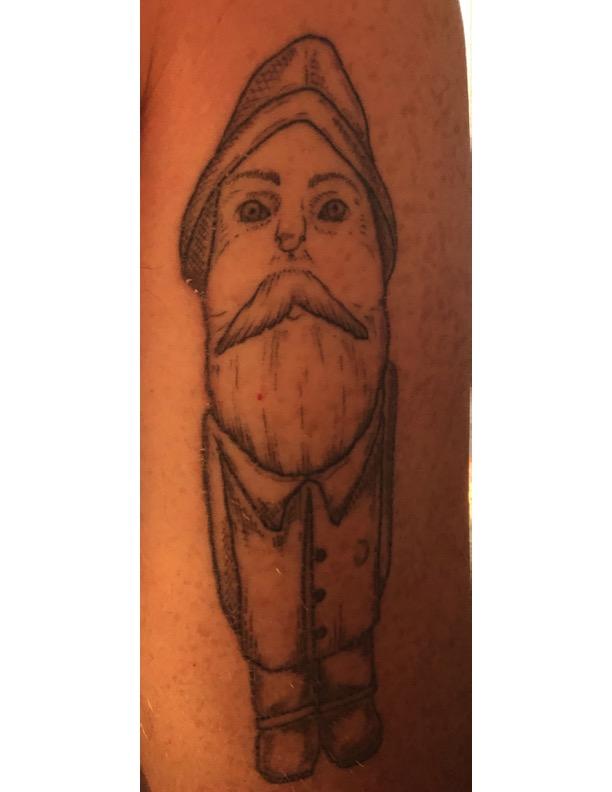Whether it’s braving the needle, raising children, or training doctors sometimes you just have to weather the storm and rely on your crew, says Peter Brindley
As a doctor I have prescribed countless needle pokes. This was cold comfort as I prepared to be on the receiving end. If I may paint a picture (pun alert) I started writing this piece to distract myself while sweating in a tattoo parlor, and alongside my terrific 17-year old son, Jack. Getting matching “tats” is admittedly an unusual high-school graduation present, but this young man is nothing if not unique and persuasive. I never sought to get “inked,” and am not a fan of the art-form. Instead, this was about creating a bond and celebrating hard-fought journeys for him and for me.
I am the proud father of two sons who are as different in chromosomes as in personality. The only difference is that one was born XY and one XX. Both are similarly unique, glorious, and exasperating. Like parenting, my medical day job has delivered lows alongside highs. My resultant moods have followed me around and for this I apologise to family, colleagues and patients. I am happier than I have been in a long time and decided that I too could make a statement. A tattoo seemed as good or bad as any other. It is a reminder of how far I have come and how far still to go. Like anything that actually matters: it will hurt and will be worth it.
My particular journey started with the need to relinquish control. I now understand that life is a complex equation, but the constants include hard graft, dumb luck, leaps of faith, and trust. This is true whether discussing how to raise a child, how to help patients, or how to be a better person. Sometimes you simply need to weather the storm. For this and a hundred other symbolic reasons, Jack and I now have matching sea captains etched on the back of our right arms (see below). Some will have sympathy for our lot in life, and some will identify with the complexity of raising kids or becoming a young man. Neither Jack nor I argue that we are anything special. Instead, we prefer to wear a silent reminder that each of us is on our own challenging journey.
 Rightly, western society is increasingly celebrating female achievements and downplaying tradition authority figures. This is overdue. It has implications for how I raise my boys and how we collectively train young doctors. I want my children, and my trainees, to grow up proud. This is easier said than done, and certainly easier than getting or giving needle jabs. For example, most doctors, whether male or female, could use a little more self-compassion. Instead, we are raised to continually judge whether our knowledge, actions, opinions and appearance fit the mould. Rigid standards help us bring our A-game, but also mean that we rarely cut ourselves or others much slack. It is also why doctors, and kids, are unlikely to share their feelings or ask for help. I have, for example, always been far better at offering advice than accepting it.
Rightly, western society is increasingly celebrating female achievements and downplaying tradition authority figures. This is overdue. It has implications for how I raise my boys and how we collectively train young doctors. I want my children, and my trainees, to grow up proud. This is easier said than done, and certainly easier than getting or giving needle jabs. For example, most doctors, whether male or female, could use a little more self-compassion. Instead, we are raised to continually judge whether our knowledge, actions, opinions and appearance fit the mould. Rigid standards help us bring our A-game, but also mean that we rarely cut ourselves or others much slack. It is also why doctors, and kids, are unlikely to share their feelings or ask for help. I have, for example, always been far better at offering advice than accepting it.
I don’t want to raise my boys with my ridiculous hang ups and impossible standards. Similarly, I don’t want to encourage young doctors to sacrifice their health and family to become yet another workaholic. On the other hand, I still expect my kids and my trainees to work hard and put others before themselves. This used to be summarized by telling people to “man up”. This language is no longer justified, helpful, or inclusive. No matter your gender, profession, or stage, we all chase a near impossible goal: to be simultaneously reliable, stoic, sensitive and empathic. Excessive energy has been expended heaping criticism on this group and that group. Much of this is simplistic, unfair, even cruel. We all need strategies to steer our own course through unpredictable seas. Jack and I feel a tad safer courtesy of our very own Sea Captain. Despite initial misgivings, I am glad to have him on my side.
Peter Brindley is a professor in the department of critical care medicine, Department of Anesthesiology and Pain Medicine, and the Dosseter Ethics Centre, University of Alberta, Edmonton, Canada.
Twitter: @docpgb
Competing interests: None declared.
Acknowledgements to Jack D Brindley
